Press roundtable - Robocop: Let's talk with José Padhila and Joel Kinneman
By Mulder, Paris, George V, 03 february 2014
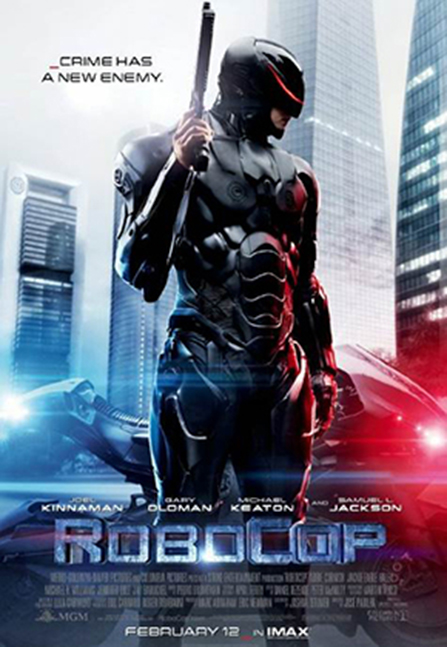
Q : What’s the biggest difference to the original Robocop ? What can the audience look forward to ?
José Padhila : the biggest difference is that one is with Peter Weller and the other with. No, I am kidding. I think there are two differences, two big differences. The biggest one is that in the original Robocop, after Alex Murphy is shot to pieces, there is a small montage and you have the robot. Alex Murphy is dead and he is a robot and he only begins to slowly come back at the end. In our vision, when Alex Murphy wakes up as Robocop his intellect is intact, his memory is there, his cognitive functions are there. You have a man who has been told that he’s a robot. In our movie, you have the journey from being a man and being told he’s a robot to actually becoming one. This allows us to talk about the philosophical side of the issue of what sets a man apart from a machine. This is a philosophical issue, although you may not think it is. But if you look at the literature and the actual default position of philosophy, most philosophers think men are nothing but organic machines. There is no such thing as free-will and this is the standard philosophic position nowadays. So we use the concept of Robocop not only to talk about the politics, the fascism when you authorize violence, about the drones. The things that we talk about also include this human dimension and his anger in his quest to this character, about what it means to be a human and also his relation to his family. I think that is the biggest difference.
Q : I read in an interview that Joel saw the original movie more than twenty times. I would like to know how he managed to create his own interpretation of this character despite the influence from the original ?
Kinneman : well there are two parts to that answer. The first one is that this is a completely different universe that Jose creates from the Paul Verhoeven one, so that makes it a lot easier and the character’s journey is completely different. He lives in a different time, so there are some similar experiences that he goes through and he becomes this suit, this robotic body. But apart from that, his journey is completely different. The second part is, even though it would have been identical, which it’s not … I come from the theatre and in the theatre, we do this all the time : we don’t think about the last person who has played Hamlet or Raskolnikov. You have to create your own universe in the universe that this particular play is being done. If you start thinking about what someone else has done, then you already failed anyway. But in this instance, it was particularly easy. If you put the two movies side by side, you will see two completely different films that have a couple of ideas that are the same, but apart from that, they’re very much their own movies.
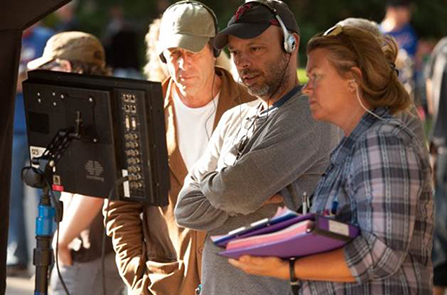
Q : Jose, your Robocop seems to be built not in the USA nor Japan but in China. So why China and why not France ?
Padhila: a short answer to that is that labour in France is way more expensive than in China and that is why America has been outsourcing a factory to China for a long time already and that was kind of a political joke about outsourcing. The funny thing is, when I spoke to Michael Keaton for the first time about the character of Sellars, the creator of the idea to put a man inside a machine, we already discussed Sellars as not being a bad guy, in the sense that super-hero movies have bad guys like the Joker. This “the Joker will kill everybody, he will blow up the city” over the top thing. We wanted to ground the movie in realistic things, like the bad guy not necessarily being a bad guy at all. He believes that the machines are good, that the robots are good and he wants that implemented into the society. He also wants to make a profit, as you know most of the CEOs do for their multinational companies. We created a character. Michael always talks about Steve Jobs, a guy who had smart technology and who had great products like Apple. But at the same time, Apple outsourced their products to China and sometimes the labour, the people who work on these products, work under very hard conditions and we tried to make a social commentary on that. That’s why Robocop has been made in China.
Q : Do you read comics and what do you think about their adaptation to the screen ?
Kinneman : I rarely read comics. I have a friend who reads them like a slave. But Robocop is actually the opposite. The film came first and then was adapted into comics. I think that most of the movies that are made right now have a preconcept : they are based on a book or a comic. For me, if it’s a good story, it’s a good story and if somebody came up with it as an original idea or if somebody took a good idea and made it into a screenplay, that is fine. I expect from every script to stand alone.
Padhila: I have read every single Astérix. It is actually belgian. So I read comic books when I was a child, not only Astérix but others. I think that the adaptations of Astérix are criminal and they are (joke). But that does not mean that all adaptations are going to be necessarily bad. At the end of the day, you know film has its own logic, its own dramatic way to construct a story. Sometimes, the comic book lends itself to be translated from what is specific about comic books in the universe of film, sometimes it does not and you can ask the same question backwards. Like Joel said about Robocop, clearly, in 1987, Paul Verhoeven made a great movie. So that concept lent itself to film. When it was translated from film to comic book, it did not quiet work, at least not for me. So it cuts both ways. I really like to think that, in a way, the dramatic characteristics of one media can’t be translated into another media and vice-versa. The same question applies to literature. Some books can be and have been successfully adapted to cinema. There are several books that have been adapted. “Catch 22” is a great book and a great film, but sometimes you can’t. You just can not adapt James Joyce’s “Finnegans Wake”. You don’t even understand what’s in there. It is all about the translation process from one dramatic structure to another. Sometimes it works, sometimes it doesn’t. It depends on the story. I actually think that the best books that get translated into films are the ones that have a simple, interesting story with good plot points, but where the literature is kind of weak. The author’s voice is uninteresting, because then it’s easier to take those stories and the plot points in order to put them into a script. Then you put a different voice as the narration, because what often bothers people that are big fans of the book is that they have a strong feeling because the voice of the author is so strong and that is so hard to translate. It is impossible.
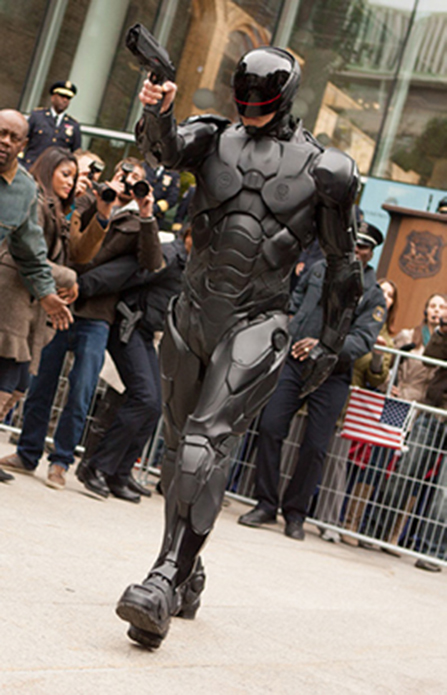
Q : Joel, how did your work go with such famous actors as Gary Oldman and Michael Keaton ?
Kinneman : it was a dream come true for me particularly with Gary Oldman and Michael Keaton as well and Samuel L. Jackson. Just to be in a film with these guys that I revere. I watched all their films. In some cases, I even studied how they work. I got to play a lot opposite Gary, because of the connection between our storylines and the way their relationship evolved. It is one of the best experiences I have had in my career and also in my life. Some of these scenes were the most difficult ones in the film, particularly the one where he revealed what was left of me. That was the scene that I looked most forward to being shot. It was the biggest challenge because the emotions that needed to be portrayed in a truthful way were those of extreme, existential anxiety and despair. Usually, when you try to portray these kind of feelings, you want to use your body. You all think of the moment when you had the most anxiety or just felt that kind of existential despair, usually, you like clinching your stomach or crying in a foetal position. As an actor, when you try to re-enact those feelings, it is very helpful to use your body. It helps the emotion to come forth. Here, I didn’t have that luxury at all. I had to strap my head in with a metal chord, which pulled my head back. As soon as I moved my head, what I naturally do during those feelings, the shot couldn’t be used. I had to be completely still and all had to come from my imagination. So it was a much higher difficulty level in that scene. My biggest help came from playing opposite Gary Oldman. His eyes were always so pleasant and engaged, so it really helped me to push me through.
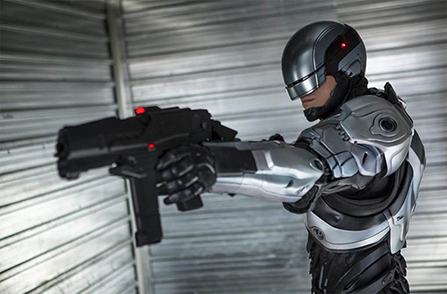
Q : Joel, in a press sheet you said that you were completely naked in the armour. Is it true and why ?
Kinneman : no, I had this unitard underneath, like a bodysuit. What I was getting to : I’d feel naked. When I was fantasizing about what the feeling would be to be amputated from your throat down, what I came up with : it must be the most naked feeling that you could ever have, to not have a body but still be aware. That made me think of these dreams that I’ve had, when all of a sudden, I’m in the middle of the city and people all around, people that I know, and I have no clothes on. I have no place to hide. The suit made me feel a little bit like that, when I was walking around on set. Not when we were shooting with a camera, but when I was walking around, I felt really awkward. So when I was trying to come up with a sort of psychology of what Alex can feel like when he becomes Robocop, moving forward, the suit became an instrument for me to find the emotional contrast. He at once has this wonderful body, but he is also extremely vulnerable. I was surprised that the suit helped me find that.
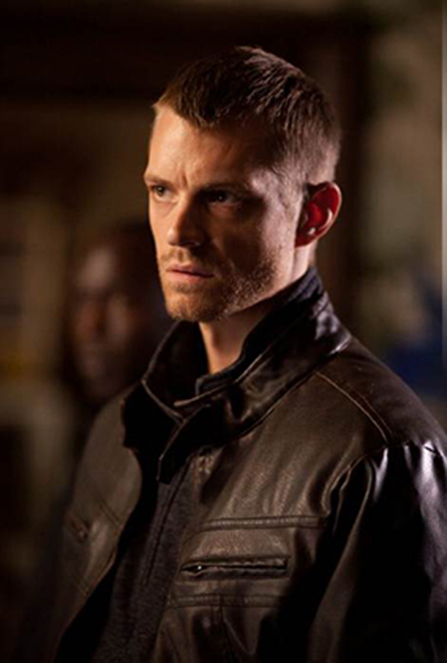
Q : If the film is a huge box-office success, will you consider doing a sequel ? Have you already signed a contract for a sequel ?
Padhila: I don’t have a contract, he does. The answer to your question is why I make movies in general and in particular. Every movie that I’ve made, I made for a reason, because the cinema talks about something that is of interest to me. I have done Robocop, a one hundred thirty million dollar movie. I also made the documentary “Garapa”, which is a twenty thousand dollar movie that I spent five years to make. It took me more time to do that movie than it took me for Robocop, five years for the first, three years for the second. For me, making a movie is about reaching an audience, to provoke thought, sometimes to provoke controversy, like with “Elite squad” (2007). On issues that are meaningful, to the audience, but also to me, mostly to me because otherwise, I will not be able to do it. In this Robocop, there is an issue that is meaningful to me, there are more than one, but there is one core issue. This one core issue, the main idea of Verhoeven, is that the automation of violence opens the door or the window to fascism and we have to be aware of that. We are already using drones, we’ll soon be replacing soldiers by machines. What happens ? What happens is that America pulled out of Vietnam because there were soldiers dying there. If you took away the soldiers and put robots, what would have happened if nobody was dying. That’s a serious issue. Every country in the world will have to define its own legislation and how to deal with this technology. Maybe in Brazil we’ll use automated law enforcement, maybe you’ll want the same for France. There’ll have to be a decision. The United Nations will have to debate about what is going to be illegal and more. Robocop was a concept that allowed me to bring these issues forward in a movie that will reach a broad audience. It has visual effects and I convinced some crazy people to back this up. Which didn’t need a lot of work, because in Hollywood, everybody is crazy. I wanted to make that movie. If you ask me if I will do a sequel Robocop, my answer depends on what it will be about. I mean, if it is not about something that interests me, I will not be doing it. If it is, I will. That decision has nothing to do with the success of the movie. The success of the movie has something to do with the funding, but not with my wish to do it.
Kinneman : but how will they do another movie if the arms are broken and he can’t play tennis ? I have done a lot of interesting characters so far, both in the theatre and in film, that had very interesting character arks and have gone through a lot of things. Robocop might be the most interesting character ark. Of course, I would like to continue Alex Murphy’s journey and to deal with who he is and what he could be. It’s always up to the audience
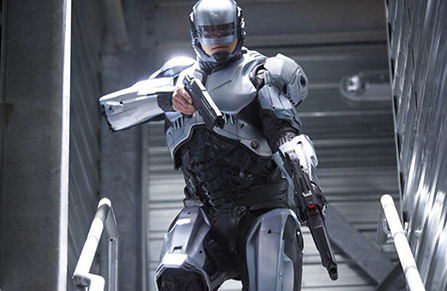
Q : The original agent Lewis is a woman. Do you think there is a possibility to imagine a woman Robocop and the man would be a house wife ?
Padhila: why not. I mean that’s already happening, maybe I will do this in the next movie (joke). It’s a good idea.
Q : Since I’ve seen Robocop, when I walk in the street, I actually walk like Robocop. Do you feel the same way ?
Kinneman : when I saw the film, I was ten or eleven years old. My mother, who is a therapist, wanted me to see one of her colleagues, because I wouldn’t stop walking like Robocop. So, I have the same experience. I was eleven and what’s your excuse ?
Q : what is your best memory from the shooting of this movie ?
Padhila: the last day, I am kidding (joke). Shooting this movie was the easiest part. It was easier to shoot than to develop the script and to post-produce for several reasons. First of all, we had a few weeks to repeat with the actors on a big empty stage, a writer, a table. We went through the script to make the things work, together with Joe, with Gary, with Michael, with Abbie, together with the whole cast and we shaped the script together. It was fundamental for my process in particular, because I always rehearse my movies in Brazil. For me, filmmaking is about finding a way to tell a story visually and everything works for the story. The camera does not work to make me look like a good director. What’s the most cool shot means nothing to me. What matters to me is what’s the best shot to tell the story. If it is the camera moving, then I’ll move the camera, if it’s the camera steady, then it’ll be steady. So that is my concept, that we’re all working towards the story. I have done it with the cast and with the film crew. The studio allowed me to bring my team from Brazil, like my director of photography. We had an editor on the set who was also the editor of my other movies in Brazil. Eric Newman, who is here, is also a friend and one of the producers of the movie. We have already worked together before. It was an environment where everybody was working to shoot the movie, from the gaffer to the boy of the set. Everybody was working together to tell the story, so it was a very pleasant shooting. When you shoot like this, it is not so difficult to actually shoot. Joel had more difficulty than I had, because he had to wear a suit that made him hot as hell. We had to blow him with cold water. But for me shooting was easy, it wasn’t that hard.
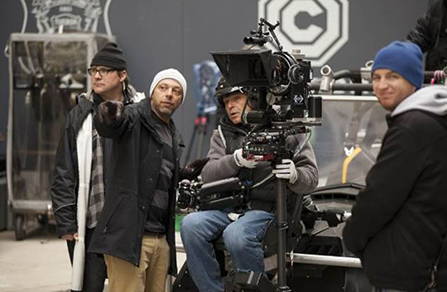
With all our thanks to Gwenn from WayToBlue agency
Interview, video editing by Mulder

